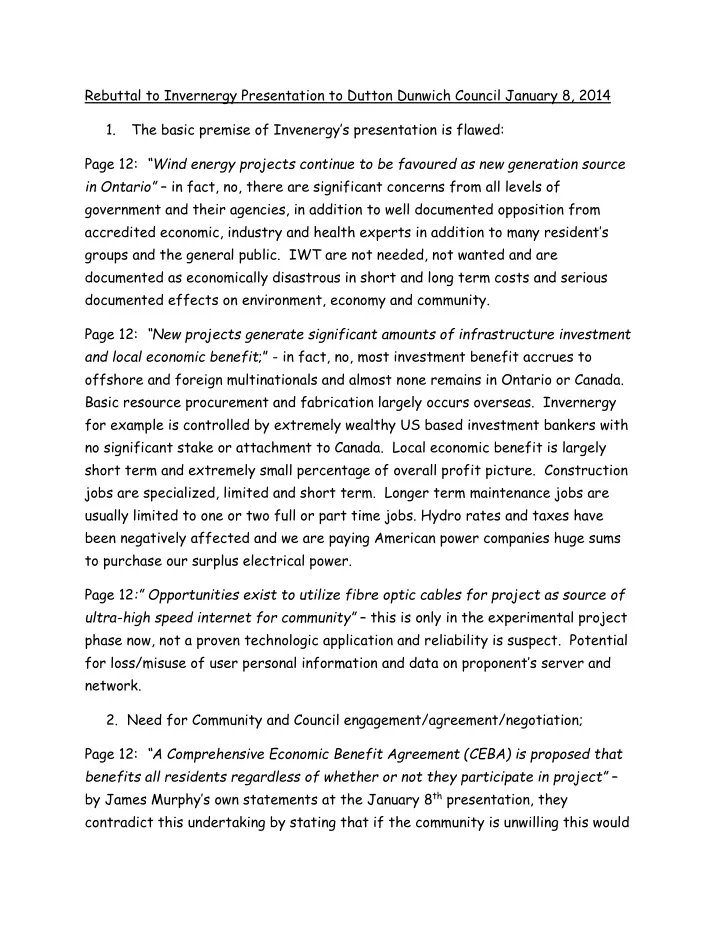

Rebuttal to Invernergy Presentation to Dutton Dunwich Council January 8, 2014 1. The basic premise of Invenergy’s presentation is flawed: Page 12: “Wind energy projects continue to be favoured as new generation source in Ontario” – in fact, no, there are significant concerns from all levels of government and their agencies, in addition to well documented opposition from accredited economic, industry and health experts in addition to many resident’s groups and the general public. IWT are not needed, not wanted and are documented as economically disastrous in short and long term costs and serious documented effects on environment, economy and community. Page 12: “New projects generate significant amounts of infrastructure investment and local economic benefit ;” - in fact, no, most investment benefit accrues to offshore and foreign multinationals and almost none remains in Ontario or Canada. Basic resource procurement and fabrication largely occurs overseas. Invernergy for example is controlled by extremely wealthy US based investment bankers with no significant stake or attachment to Canada. Local economic benefit is largely short term and extremely small percentage of overall profit picture. Construction jobs are specialized, limited and short term. Longer term maintenance jobs are usually limited to one or two full or part time jobs. Hydro rates and taxes have been negatively affected and we are paying American power companies huge sums to purchase our surplus electrical power. Page 12 :” Opportunities exist to utilize fibre optic cables for project as source of ultra-high speed internet for community” – this is only in the experimental project phase now, not a proven technologic application and reliability is suspect. Potential for loss/misuse of user personal information and data on proponent’s server and network. 2. Need for Community and Council engagement/agreement/negotiation; Page 12: “A Comprehensive Economic Benefit Agreement (CEBA) is proposed that benefits all residents regardless of whether or not they participate in project” – by James Murphy’s own statements at the January 8 th presentation, they contradict this undertaking by stating that if the community is unwilling this would
be retracted. The clearly stated threat is that if the community does not fall in line, Invernergy will withhold funds generated. Smacks of bullying and bribery – not favourable behaviours upon entering a negotiated “partnership”. 3. Page 13 : Invernergy states and agrees in several instances that there exists legislated and contractual requirements to reach agreement on many aspects of project, plans, placements, setbacks, and revenue aspects. Yet, James Murphy indicated in his presentation that these requirements were somehow flexible and dependent on capitulation and agreement by the community and council. Again, implying threats and bribes. 4. Page 14: Details on underground collection systems, roads, decommissioning and ongoing communications: There will be real and significant risks and liabilities the township, council and residents will be accepting and becoming financially responsible for. Costs inherent with IWT projects need to be clearly established and accounted for up front. For example, it is suggested in the literature that decommissioning will be in the $1Million range per tower. Prudent risk management suggest that a letter of credit of $1M per tower be on deposit at a Canadian bank in the name of the municipality before construction begins. Otherwise the council will be respoosible remediation costs. 5. Page 15: Jim Murphy and the document clearly stated that reduced setbacks would be imposed to punish the Dutton community if the CEBA was not in place. Besides being contrary to legislated established Green Energy Act regulations, it is highly unethical if not possibly illegal. 6. Pages 16 and 17 : Revenues were again being threatened in relation to acceptance of CEBA. As well, there were contradictory statement regards actual versus proposed generation levels to be used to calculate the return to the township. If actuals are used, the revenue would be substantially less that the stated $2,500 per MW. This amount is also in question based on the current assessment limit of $40,000 per MW which would yield less than $300 per MW (assuming the DD 2013 residential mil rate). As well, a very large uncertainty now exists depending on the new OPA RFQ, RFP process – if lowest bid wins is the practice, the available revenue will be significantly reduced, hence a much lower return, if any, to Dutton Dunwich.
New OPA RFQ/RFP process for Large Renewable Procurement: Ontario Power Authority seems to have heard the concerns of many groups with Industrial Wind Turbines (IWTs) and is proposing substantial changes to their process. Aspects of the new proposed process will address some community engagement issues in that it will be a requirement to engage the community and gain agreement and acceptance before being granted RFQ status to proceed to FRP process.
Recommend
More recommend